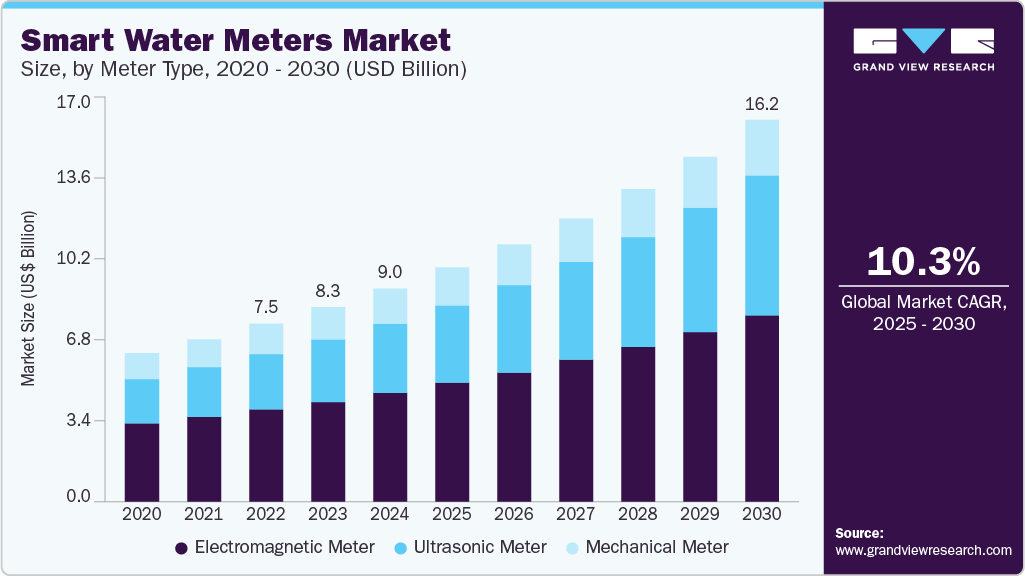Smart Water Meters Market: Unlocking the Power of AMR & AMI
The global smart water meters market was valued at USD 9,051.3 million in 2024 and is projected to reach USD 16,190.2 million by 2030.
The global smart water meters market was valued at USD 9,051.3 million in 2024 and is projected to reach USD 16,190.2 million by 2030, growing at a CAGR of 10.3% from 2025 to 2030. The smart water meters industry focuses on advanced metering devices that provide accurate, real-time monitoring of water consumption.
Unlike traditional meters, smart water meters incorporate digital technology, sensors, and communication modules, which allow for remote data collection, leak detection, and usage alerts. These capabilities help utilities optimize water distribution, reduce losses, improve billing accuracy, and empower consumers to manage their water usage more effectively.

Technological advancements, such as the integration of IoT, AI, and data analytics, are enhancing the functionality of smart water meters. These advancements enable improved data accuracy, predictive maintenance, and better operational efficiency. For example, in February 2025, the Coimbatore City Municipal Corporation announced plans to implement an IoT-based smart water distribution system to ensure equitable water supply across 40 wards added to the city post-2011. Communication technologies like Advanced Metering Infrastructure (AMI), Radio Frequency (RF), Power Line Communication (PLC), and Broadband Over Power Lines (BPL) facilitate seamless two-way communication between meters and utilities, reducing manual labor and operational costs.
The competitive dynamics in the smart water meters industry involve both established multinational corporations and specialized regional players. Companies are focusing on innovation, sustainability, and strategic partnerships to enhance product offerings and expand market reach. Efforts to develop recyclable materials and biodegradable components align with broader environmental goals. Collaborations between meter manufacturers and technology providers are also enabling the creation of integrated solutions that address evolving market demands and promote efficient water management worldwide.
Order a free sample PDF of the Smart Water Meters Market Intelligence Study, published by Grand View Research.
Key Market Trends & Insights
- North America held the largest market share, accounting for 46% of the global market in 2024. The adoption of smart water meters in this region is driven by a combination of aging water infrastructure, environmental concerns, and technological advancements. The region’s utilities are increasingly adopting smart meters to minimize leaks, improve operational efficiency, and enable real-time monitoring and proactive maintenance.
- Meter Type: The electromagnetic meter segment led the market with 60.4% of the revenue share in 2024. This growth is attributed to the high accuracy, long-term stability, and ability to measure water flow without moving parts. Electromagnetic meters are ideal for larger pipe sizes and challenging water conditions, making them suitable for urban and industrial applications. Their compatibility with remote data transmission and integration into smart water management systems continues to drive their adoption globally.
- Technology: The automatic meter reading (AMR) segment held the largest revenue share in 2024. AMR is growing due to the increasing need for efficient water management and the reduction of non-revenue water by providing accurate, real-time data collection. With rising urbanization and infrastructure development, utilities are modernizing metering systems, while AMR also helps in reducing manual labor and operational costs, as well as minimizing human error. Regulatory pressures and sustainability goals are accelerating the adoption of digital water solutions.
- Application: The residential segment accounted for the largest share of the market revenue in 2024. This growth is driven by increasing awareness of water conservation and the need for accurate billing. Smart meters enable households to monitor water usage in real-time, detect leaks, and reduce wastage. Additionally, government regulations and smart city initiatives are driving the adoption of smart water meters in residential areas. The market for residential applications is expected to grow steadily as IoT and data analytics technologies advance.
Market Size & Forecast
- 2024 Market Size: USD 9,051.3 Million
- 2030 Projected Market Size: USD 16,190.2 Million
- CAGR (2025-2030): 10.3%
- North America: Largest market in 2024
- Asia Pacific: Fastest growing market
Key Companies & Market Share Insights
Leading companies in the smart water meters market include:
- Honeywell International Inc.: Honeywell offers smart water meter solutions through its acquisition of Elster, a German company specializing in metering solutions for electricity, water, and gas. Elster’s products enable advanced communication, networking, and software solutions for efficient water metering, enhancing Honeywell's market presence in the smart water meters space.
- Landis+Gyr: Specializing in metering solutions for gas, water, and electricity, Landis+Gyr provides a wide range of commercial, industrial, and residential metering products. The company also offers energy metering & management software, hardware, and data management solutions, alongside automated meter management and advanced metering infrastructure installation services.
Other notable players in the market include Itron Inc., Sensus, Kamstrup A/S, and Badger Meter, Inc., which are actively contributing to the industry through innovations and partnerships.
Key Players
- Aclara Technologies LLC. (Hubbell)
- BMETERS Srl
- Diehl Stiftung & Co. KG
- Datamatics Global Services Limited
- Honeywell International Inc.
- Badger Meter, Inc.
- Itron Inc.
- Kamstrup A/S
- Landis+Gyr.
- Xylem (Sensus)
- Neptune Technology Group Inc.
- ZENNER International GmbH & Co. KG
Explore Horizon Databook – The world's most expansive market intelligence platform developed by Grand View Research.
Conclusion
The smart water meters market is poised for significant growth from 2025 to 2030, driven by the need for efficient water management, the reduction of non-revenue water, and technological innovations such as IoT and AI. North America is expected to maintain its leadership in the market, while Asia Pacific will experience the fastest growth due to rapid urbanization and infrastructure development. As the adoption of electromagnetic meters and automatic meter reading technologies increases, utilities and consumers alike will benefit from enhanced operational efficiency, cost savings, and improved water conservation. Companies in the smart water meter industry are focusing on sustainability, innovation, and strategic partnerships to meet the evolving needs of the market and contribute to global water management solutions.